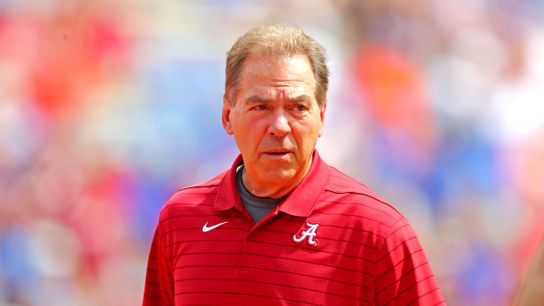Before we dive in, let's get to the caveats and the "yeah, but"s.
-- They're not digging ditches or tarring roofs.
-- Coaching isn't the only line of work that regularly requires seven days of attendance.
-- If they don't like it, they can quit.
-- Many of them are highly paid for the time they put in.
With all that said, Nick Saban shared a statistic in an interview with SiriusXM during the SEC spring meetings that had a lot of coaches nodding their heads.
Most surprising thing I heard at @SEC Spring meetings.
— Peter Burns (@PeterBurnsESPN) June 1, 2023
Saban told us on @SIRIUSXM they they tracked how many weeks of the year they work 7 days a week.
The answer:
44.
God bless assistant coaches and CFB staffs.
Honestly, it's a struggle to find the eight weeks on the calendar when coaches aren't in the office or on the road all seven days: July for sure, pockets of May, maybe a week in January depending on your bowl game, a few days after the February signing period?
FootballScoop spoke with a Power 5 head coach recently who said June has quickly become one of the most intense months of the year, with camp season running concurrent with the new official visit schedule.
At the AFCA convention in January, I asked a Group of 5 head coach how many days he truly checks out of work. After thinking about it a bit, his answer was in the single digits.
Again, this is a job that requires you to coach football. I can't count the number of times I've heard coaches say "We have the best job in the world" at the convention.
But, still. I don't care what job you have: 44 seven-day weeks is a lot. It's a lot if you get to the office at 9 and leave at 5. If you're a professional ice cream tester, testing ice cream seven days a week for 44 weeks a year is a lot.
That type of schedule takes a toll, and it especially takes a toll on your family. The thing about working seven days a week for 44 weeks a year is that it's tough to pull your mind out of work mode when you're not at work. The human mind isn't a microwave that can be unplugged, it's a refrigerator that hums 24 hours a day. Like anything else, mentally unplugging is a skill that takes practice.
It's not as if the other eight weeks are a breeze, either. The pace can get slow at times, sure, but the number of days where the average coach clocks out after 10 p.m. dwarfs the days when they're out before 5. And recruiting truly never stops.
Now consider that, while many coaches earn generational wealth with each new contract, most in the industry do not. Very few have job security that lasts more than 10 months at a time, dependent upon factors largely out of their control.
It's not digging ditches, and it's not saving lives. But it's not easy, either.
